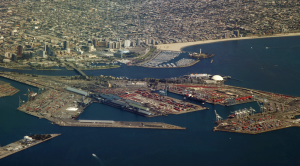The many businesses that depend directly on efficient goods movement through West Coast ports are anxiously awaiting the successful completion of negotiations for a port worker labor contract.
Earlier this month, a federal mediator stepped in and contract negotiations resumed between the Pacific Maritime Association (PMA) and the International Longshore and Warehouse Union (ILWU).
Negotiations began in May 2014; the existing contract expired in July 2014.
Letter to Negotiators
The California Chamber of Commerce was among 175 business groups that sent a letter to the heads of the ILWU and PMA on January 16 asking for a “renewed commitment to stay the course, complete the contract negotiations as soon as possible and work to resolve the current congestion issues without further interrupting the flow of commerce.”
The groups represent a wide array of companies—manufacturers, farmers and agribusinesses, wholesalers, retailers, importers, exporters, distributors, and transportation and logistics providers.
About 70% of containerized cargo moves through ports in California, Oregon and Washington.
The Southern California ports of Los Angeles and Long Beach are the busiest and second busiest in the nation, while the Port of Oakland ranks as the third busiest.

Competition
The high stakes of continuing uncertainty at the West Coast ports are outlined in the letter from the business groups. The letter points out that overseas competitors highlight the problems at West Coast ports as a reason not to buy U.S.-made or –grown products.
“Manufacturers in the Midwest have had to slow and even stop production lines due to delays in receiving containers from the West Coast that hold critical inputs.
“Retailers are now seeing delays of early spring merchandise including products for Valentine’s Day and Easter.”
Citing supply chain disruptions across all industry sectors in recent months, the letter continues, “It is a black eye for the broader economy and some jobs have and will continue to be lost as a result of continued delays at the ports.”
Jobs
The ILWU represents 20,000 West Coast full- and part-time dockworkers.
Port activity at ILWU marine terminals supported nearly 3.7 million California jobs in 2013, and contributed $742.8 billion to the state’s economy, about 37% of gross state product, according to a study prepared for PMA and released in April 2014.
PMA’s principal business is to negotiate and administer maritime agreements with the ILWU. This includes a coast-wide contract covering longshore, clerk and foreman workers at 29 ports along the West Coast, from Southern California to the Pacific Northwest.
Background
In November, the CalChamber joined the U.S. Chamber and other business groups in signing a petition on the White House website urging President Barack Obama to get involved to end the port dispute.
The West Coast lockout 12 years ago cost the U.S. economy $1 billion a day. It took half a year for the ports to clear the backlog and recover from that 10-day shutdown.
A shutdown now would be even more costly, according to a June 2014 study released by the National Association of Manufacturers and the National Retail Federation. That study estimated impacts of nearly $2 billion a day for a five-day interruption.
Staff Contacts: Jeremy Merz, Susanne Stirling
Indoor Lighting Supplier on Impact of Port Crisis
“The Long Beach port is having a tremendous negative effect on our business and others who depend on product coming from overseas. This problem is affecting much more than just California.
“As a business-to-business company, we have more than 2,000 customers across the United States, Canada and South America who depend on us to provide them with product. Magnify that 2,000 by the number of customers they service and it starts to multiply tenfold very quickly. Our product is all distributed from our local warehouse here in Southern California and of course this problem has an effect on the number of jobs we can offer.
“Cash flow is negatively impacted by the product being ‘held’ at the port. Product needs to be paid for prior to our company even having the opportunity to ship to our customers because of the delays.
“We need the government of the United States to step up, recognize and put an end to this nonsense that is having such a negative effect on business. Businesses are already hurting; we do not need more issues added to an already-lackluster economy.”
—David Lu, President/CEO, Lite Source Inc., Chino

